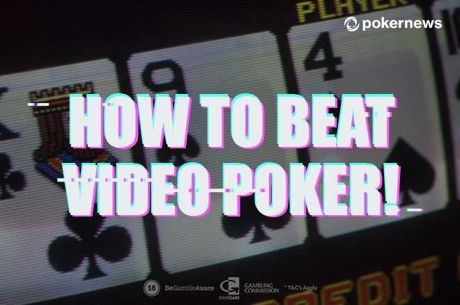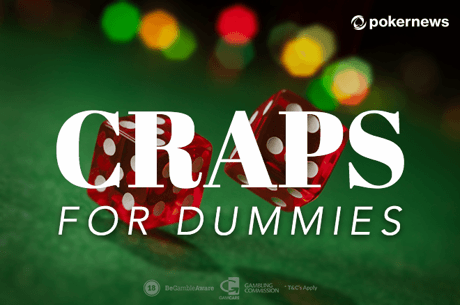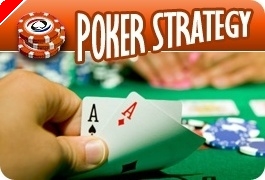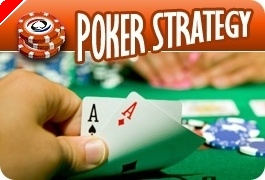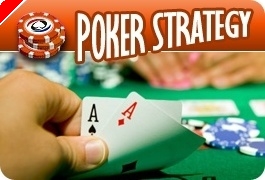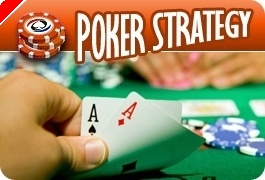Stud Poker Strategy: Conquering Fear at the Table

It's corrosive. It eats away at your best judgment and withers your poker stack. It conquers all of the skills of aggression, patience and self control that you've taken years to master.
It's fear.
Know this: If you are afraid to lose, you will not, in the long run, win. You will lose more slowly than you would without any skills, perhaps. You will end sessions earlier and perhaps protect small wins more often. But overall you will be a loser because you will not be able to take advantage of optimal strategy and optimal situations that you will shy away from out of fear.
There are many sources of fear. Some players fear losing the money itself. They are scared by playing for sums of money that, in the working world of bills, expenses, jobs, and the like, make a difference. They see a $20 bet as half a tank of gas. They see a $1,500 pot as a mortgage payment. And they fear losing the money to pay for these things. So they play 'scared'.
Others are afraid to lose for more psychological reasons. They play poker for the mental satisfaction of winning. They play for ego. And so a loss, any loss, cuts into their self-esteem. Some folks have a hard time handling that kind of mental damage, and so they avoid conflicts that they should encourage, or they leave too soon.
Here's an example. See if it can be applied to you.
Horace loves the idea of competition in poker. He comes down to the nearest poker room, puts $1,000 up at the cashier's window and buys in to the $20/40 game. He is filled with optimism.
The game is populated by four or five well-known runners and gunners – wild and loose gamblers who love to have their money riding on uncertain outcomes. There are no pros – none of the really tough players he faced before. This table is a fish tank.
Sure enough, on the very first hand, our hero gets wired aces and a king for an up card. He's high and raises the bring-in. Three of the loose players call him all the way to the river. They also started with pairs, or a flush draw, or nothing. They didn't care. They just wanted to run him down. None of them did. He won the hand and a huge pot – more than $500 in profit on that one hand.
He plays on, tightening up his play to protect his winnings. He doesn't take chances even when he's in the lead – or drawing with the best of it. He waits for aces or kings to start. After nearly an hour, having lost back about $100 in antes and forced bets, he's finally awarded with a pair of kings. He plays it aggressively and once again is blessed with three callers. He doesn't get a second pair and loses on the river.
He plays for another twenty minutes, losing back another $100 or so. He's now ahead about $100. The rammers and jammers are going strong, pumping up the pots, losing their shirts much of the time but enjoying the game. It's about 3:00 PM in the afternoon. The day is young.
Even so, our hero looks at his stack. He now has $1,100. He starts to think. He mulls over his one big loss, when he got out drawn with a pair of kings. He's afraid he'll get sucked out on again – and maybe a few times – and finish down a few hundred, instead of being up the $100 as is he now.
"Time to call it a day," he concludes. And he leaves.
He's a victim of fear.
This is not a stamina problem. It's a fear-of-losing problem. And it propels him away from a situation that is ripe with potential profit. But he can't stomach the risk to his winning session. And so, out of fear, he leaves.
Some of you might agree that this player costs himself a bigger win. But you might also think that there's no risk of a loss, at least, since Horace is leaving up for the day. You would be wrong. You see, Horace may be leaving up today. But he has lost enormous potential profit. And in the long run, that's as bad as losing.
Here's why. There will be other sessions when the hands will be reversed. He will first get the pair of kings and be outrun by some chasers. And he'll be down, but his fear of losing will propel him to stay until he wins. But on some of those occasions he won't win the next hand and go back ahead. He'll lose again. And then he'll lose some more. And he'll keep right on losing. If he's prudent, he'll only stay until his stamina deprives him of full energy, and then he'll leave, down an enormous loser for the session. A session of getting outrun by chasers happens. And when it happens to him he'll lose as much as we all will lose. But since he is afraid of losing, he won't allow himself the time at the really good table to more than make up for these losing sessions. He'll leave too soon, and so the net result across his mulitple sessions will be a loss.
Players who are afraid of losing and leave to protect their small wins fail to win enough when the going is very good. In the long run they deprive themselves of the necessary profit from profitable situations to balance out the losses that they will surely have when the situation isn't profitable. It happens all the time.
Here are some ways of correcting this problem. It may be the most valuable lesson in your poker education.
Some suggest that you just stay as long as the game is good and then leave. The problem is that it invites rationalizing and downright lying to yourself about how good the game is. Think about the pathetic gamblers who are down thousands and justify it by saying to anyone who'll listen, "But the game is really good!" Well, the same thing happens in reverse. Players convince themselves that the game is no longer any good, and then leave with tiny wins that don't reflect how good the game really is.
First suggestion. Play with a very messy stack. Just leave yourself a mound of chips – no nice, even stacks. This will make counting your chips very difficult. Re-buy regularly, so you really won't know without thinking about it whether you are up or down for the session.
Then, leave at a pre-set time. Make it six or more hours, to develop your game stamina as well. Don't base your decision to leave on how you are doing. Only calculate how you did for the session after you get up from the table.
At the end of each session, spend fifteen minutes writing down as many objective comments as you can, about how good or bad the players were. Get in the habit of thinking about them after the game is done. You've taken your decision of whether to stay or leave out of the equation – so your analysis will be more objective.
See if your analysis of how good or bad the game was corresponds with your winnings or losses.
For those who fear losing money, there's a simple solution. First of all, make sure that you are not playing in a game that is too big for your bankroll. Forget about your ego and the possible thought that playing in a small game seems beneath you. Step down a couple of rungs on the ladder and play small – at least until you've gained the confidence you need to play bigger.
Second, buy in for an especially large stack for the game. If it's $2/4, buy in for $500. If it's $5/10 buy in for $1,000. If you can't buy in for that large an amount, either play smaller or wait until your bankroll is sufficient for the overly large buy-in.
What you're doing is making your stack so large that you will tend not to think about the money, but view the individual bets as chips. If your stack is small, each loss makes a noticeable dent. If the stack is large, the dents will seem small to the point of inconsequence.
Third, keep a separate poker account. Don't mix poker money with the rest of your life. If you can, keep all your money in a safety deposit box at the poker room or casino. If you can't do this, then have an account strictly dedicated to poker. Neither draw on it or supplement it with money from your straight life.
In this way you will be weaning yourself from the connection between money that you bet, win and lose at the poker table and money that you spend and earn. It should help lessen your fear of losing the poker money, since it will be disconnected from the currency of your life.
Finally, if you find that in spite of all of your best efforts to eliminate fear from your game, you just cannot keep it from creeping in and affecting your playing decisions, there are only two possible options. You must either give up the game entirely or keep your sessions so brief that the impact of your fear does not have a chance to affect your play. For some players, fear is something that creeps up on them the longer they play. In this case, quit early to have a shot at diminishing fear's corrosive effect on your game and your stack.

